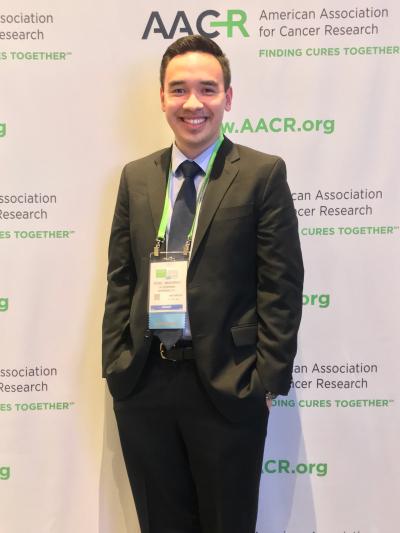Surgery is associated with increased survival for patients with HER2-positive stage 4 breast cancer

Credit: AACR
A student at the University of California, Riverside, presented research results at the annual meeting of the American Association for Cancer Research, or AACR, in Atlanta showing that surgery is associated with higher survival rates for patients with HER2-positive stage 4 breast cancer compared with those who did not undergo surgery.
The protein HER2, or human epidermal growth factor receptor 2, can play a role in the development of breast cancer.
“Between 20% and 30% of all newly diagnosed stage 4 breast cancer cases are HER2-positive,” said Ross Mudgway, the study’s lead author and a third-year student in the UCR School of Medicine. “This form of breast cancer once had poor outcomes, but in recent years, advances in targeted therapy have led to improved survival.”
Mudgway explained at the meeting that in recent years, most patients with HER2-positive breast cancer have been treated with systemic therapy, which could include chemotherapy, targeted therapy, or endocrine therapy.
“Surgery is sometimes offered to these patients, but previous research on whether surgery improves survival has yielded mixed results,” he said.
According to Mudgway and senior author Dr. Sharon Lum, a professor in the Department of Surgery-Division of Surgical Oncology and medical director of the Breast Health Center at Loma Linda University Health, HER2 status has been reported in large registry data sets since 2010, but the impact of surgery on this type of breast cancer has not been well documented across hospital systems. The researchers conducted a retrospective cohort study of 3,231 women with HER2-positive stage 4 breast cancer, using records from the National Cancer Database from 2010-12.
They found that 89.4% of the women had received chemotherapy or targeted therapies, 37.7% had received endocrine therapy, and 31.8% had received radiation. Overall, 1,130 women, or 35%, received surgery.
The researchers found surgery was associated with a 44% increased chance of survival, assuming the majority also had systemic treatment.
“This suggests that, in addition to standard HER2-targeted medications and other adjuvant therapy, if a woman has stage 4 HER2-positive breast cancer, surgery to remove the primary breast tumor should be considered,” Lum said.
The study also examined factors associated with receipt of surgery and found that women with Medicare or private insurance were more likely to have surgery and less likely to die of their disease than those with Medicaid or no insurance. White women were also more likely than non- Hispanic black women to have surgery and less likely to die of their cancer.
“These results suggest disparities in health care due to race and socioeconomic factors, and these must be addressed,” Mudgway said.
According to Mudgway and Lum, numerous factors may contribute to a physician’s decision about whether to recommend surgery, including other chronic diseases in the patient, response to other forms of treatment, and overall life expectancy.
“Our findings should be considered in the context of all other factors,” Mudgway said. “For patients, the decision to undergo breast surgery, especially a mastectomy, can often be life- changing as it affects both physical and emotional health. The patient’s own feelings about whether or not she wishes to have surgery should be considered.”
Mudgway was invited to discuss the research project at a press conference held at the AACR meeting. The conference received more than 5300 abstract submissions. Mudgway’s abstract was one of only 17 selected for the press program.
###
The study was self-funded by the Department of Surgery at Loma Linda University.
Eileen Loftus at the AACR contributed significantly to this article.
Media Contact
Iqbal Pittalwala
[email protected]




